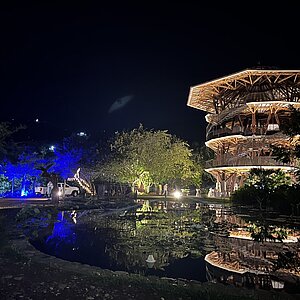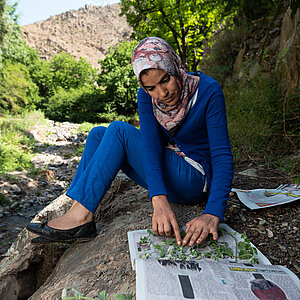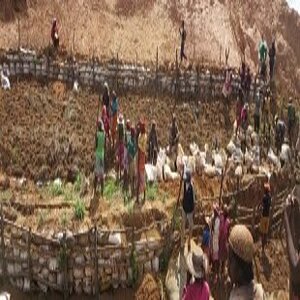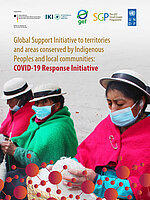Support to indigenous peoples’ and community conserved areas and territories (ICCAs)
Indigenous peoples and local communities play a crucial role in the conservation of biological diversity. The project supports these communities in 45 countries in preserving their traditional habitats and protecting biodiversity. Among other methods, this is done through a small project fund. Knowledge and resources are also built up in local communities to manage and preserve protected areas. The overall aim here is to create a fairly managed network of protected areas. The habitats of indigenous communities living in the areas are also to be improved and safeguarded. Traditional knowledge and uses should be recognised and addressed in state planning processes. The partner countries are also given advice on the implementation of their protected area strategies. In response to the COVID-19 pandemic, the project was expanded to mitigate the direct impacts of the COVID-19 pandemic and to contribute to pandemic prevention.
- Countries
- Afghanistan, Argentina, Belize, Benin, Bolivia, Brazil, Burkina Faso, Cambodia, Cameroon, Central African Republic, China, Colombia, The Democratic Republic of Congo, Congo, Ecuador, Guatemala, Guinea, India, Indonesia, Iran, Jordan, Kenya, Kyrgyzstan, Madagascar, Malaysia, Maldives, Mexico, Federated States of Micronesia, Mongolia, Morocco, Namibia, Niger, Nigeria, Panama, Papua New Guinea, Paraguay, Peru, Philippines, Senegal, Tajikistan, Tanzania, Tunisia, Vanuatu, Viet Nam, Zambia
- IKI funding
- 27,000,000.00 €
- Duration
- 11/2013 till 06/2025
- Status
- open
- Implementing organisation
- United Nations Development Programme (UNDP)
- Political Partner
-
- Secretariat of the Convention on Biological Diversity (SCBD) - Canada
- Implementing Partner
-
- Indigenous Peoples and Community Conserved Territories and Areas (ICCA Global Consortium)
- International Union for Conservation of Nature and Natural Resources (IUCN) - Switzerland
State of implementation/results
- Global ICCA Support Initiative supported the organization of the ‘Trua World Summit on Traditional Knowledge Related to Biodiversity’ (Trua TK Summit) in August 2024. The overall objective of the Trua TK Summit was to increase the visibility of traditional knowledge related to biodiversity and the contributions of Indigenous Peoples and local communities to biodiversity conservation and climate action, in order to achieve the goals of the Kunming-Montreal Global Biodiversity Framework (KM-GBF) and the Paris Agreement.
- 2024, the Global ICCA Registry database was updated and relaunched online, including an interactive map and summary of the latest ICCA Registry data.
- At a side event at CBD COP 15 UNEP WCMC launched a new digital mapping app for ICCAs entitled ‘Mapeo’ developed in partnership with Digital Democracy, Forest Peoples Programme, WCMC, and the ICCA GSI.
- The ICCA-GSI publication was launched in December 2022 at CBD COP 15 to present the consolidated results achieved from 2014 until 2022 and future directions aligned to the new GBF. The ‚State of IPLCs Report‘ and the ‚Territories for Life: 2021 Report‘ have been launched in 2021.
- As part of the project expansion in 2021, additional small grants were provided in 45 countries and a website page was added. Trainings on monitoring and indicator tracking tools have been undertaken in 45 countries.
- As of September March 2024, a total of 655 projects implemented/being implemented directly benefit 1,9 million people and have positively influenced over 11.1 million hectares of land. A total of 559,059 people gained capacities in managing their ICCAs according to their self-determined priorities.
- The project sets a clear emphasis on knowledge management to highlight the projects’ impacts. Some examples include
- strengthening leadership and technical capacity of Indigenous Peoples who currently live in voluntary isolation or are undergoing initial contact with the outside world in Peru to protect their lands (undp-nature.exposure.co/…)
- rediscovering native seeds and indigneous conservation methods in Bolivia’s Chiquitano Forest leads to environvenmental and economic sustainbablity (undp-nature.exposure.co/…)
- enhancing indigenous youth skills to lead action on climate-resilient agriculture in Guatemala (undp-nature.exposure.co/…)
- turning youth into powerful ambassadors for biodiversity and ecosystem conservation, spurring action to protect unique Guatemalan wetlands (www.sgp.undp.org/…)
- revitalizing indigenous conservation methods in Iran to safeguard wetlands (www.sgp.undp.org/…), and
- establishing the first agro-forestry concession managed by indigenous peoples and local communities in Belize (undp-nature.exposure.co/…)
- Additionally, a variety of knowledge management tools is available to support the ICCAs. These include a database for capacity building and knowledge transfer, a website for the registration of ICCAs, webinars and trainings in target countries and side events at conferences.
- UNEP-WCMC has launched an online information platform for ICCAs (July 2017) that complements the UNEP WCMC data manual. The webinar recordings are available in English, French and Spanish on the You Tube channel of UNEP WCMC. (www.youtube.com/…) As of March 2024, over 31,179,900 hectares of ICCAs spread over 310 ICCAs in 24 countries and territories have been registered at the international level in the Global ICCA Registry managed by UNEP WCMC.
- The ICCA Self-Strengthening Process (SSP) was completed by the Global ICCA Consortium and made available to the ICCA-GSI countries in English, French, and Spanish and Portuguese (www.iccaconsortium.org/…)
Latest Update:
04/2025
Further links
- Photo story: Future-proof Farms In Guatemala, indigenous youth are leading action on climate-resilient agriculture
- Photo story: Fighting for their future: How youth are reviving traditional Senegalese wrestling, safeguarding indigenous medicine, and protecting their forests
- Photo story: The Spirit of the Land: Revitalizing cultural, environmental and economic linkages - strengthening forest and biodiversity conservation in community-conserved areas overlapping with the Saola Nature Reserve, Viet Nam
- Photo story: Non-abandonment of the ab-bandaans: Safeguarding Iran’s wetlands through culture-based solutions
- Factsheet: ICCA GSI country report Belize
- Factsheet: ICCA GSI country report Benin
- Factsheet: ICCA GSI country report Colombia
- Factsheet: ICCA GSI country report Indonesien
- Factsheet: ICCA GSI country report Madagascar
- Factsheet: ICCA GSI country report Malaysia
- Factsheet: ICCA GSI country report Morocco
- Factsheet: ICCA GSI country report Viet Nam
- Factsheet: ICCA GSI country report Paraguay
- Factsheet: ICCA GSI country report Tanzania
- Factsheet: ICCA GSI country report Senegal
- Factsheet: ICCA GSI country report Zambia
- Photo story: The Living Forest: Innovative conservation efforts of the Kichwa people of Sarayaku earn the Equator Prize 2021
- Photo Story: Defending Earth’s Defenders Strengthening Matsés Protection in Peru’s Amazon
- Photo Story: Almonds and Joy: Conservation and Sustainable Use of Almonds in Bolivia’s Chiquitano Forest
- Publication: The Global Support Initiative to territories and areas conserved by Indigenous Peoples and local communities: COVID-19 Response Initiative
Project relations
Legend:
The link has been copied to the clipboard







![[Translate to English:]](/fileadmin/_processed_/a/5/csm_20221215_CBDCOP15_2029ff5619.jpg)


![[Translate to English:] Walhai](/legacy/_processed_/d/4/csm_20210608_Walhai_Miguel_Schmitter_0106af1a48.jpg)





